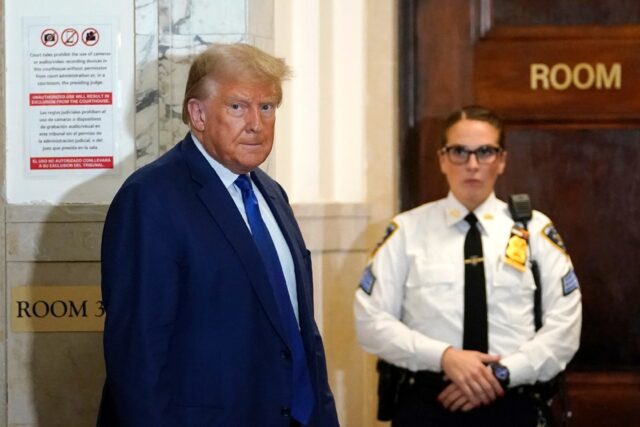
Donald Trump rose to political power touting the business acumen he says made him a fortune.
On Monday, the 77-year-old once and potentially future president is expected to take the stand at a civil trial in which he stands accused of fraudulently inflating those famous assets to advance his real estate empire.
Trump’s son Eric says he is “very fired up” ahead of his testimony — due to begin at 10:00 am (1500 GMT) — before New York judge Arthur Engoron, with whom the Republican has had a fractious relationship since the trial opened last month.
Just as he has insulted the judges overseeing his four criminal trials, Trump has called Engoron “unhinged” and a “Trump-hating, radical left, Democrat operative.”
Engoron has responded by slapping Trump with two fines — one for $5,000, another for $10,000 — when he ruled the onetime reality television star had violated a partial gag order imposed after he bashed the judge’s clerk on social media.
Trump has been heard twice in connection with this case — on August 10, 2022 and again on April 13 of this year.
In excerpts from the first deposition, he called the proceedings “the greatest witch hunt in the history of our country,” and called New York state attorney general Letitia James an “out of control prosecutor.”
Fraud
The bench trial — there is no jury, and the judge will decide on his own — is just one of a long line of legal troubles for the candidate who is currently the 2024 Republican presidential frontrunner, according to opinion polls.
So far, two of his children — Donald Jr and Eric — have testified, along with executives from the Trump Organization, a conglomerate that manages skyscrapers, luxury hotels and golf clubs around the world.
Even before opening arguments, Engoron ruled that James’ office had already shown “conclusive evidence” that Trump had overstated his net worth on financial documents by between $812 million and $2.2 billion between 2014 and 2021.
As a result, the judge ordered the liquidation of the companies managing the assets in question, such as the Trump Tower and 40 Wall Street skyscrapers in Manhattan and the opulent Seven Springs private estate in the suburbs.
Simply put: Trump would lose control of part of his real estate empire.
Criminal trials
That order is on hold pending appeal, but its potentially sweeping consequences highlight the high stakes for the former president, who has built his political persona on the image of the successes described in his book “The Art of the Deal.”
This trial is only the tip of the legal and logistical iceberg for the candidate, as he also stares down four criminal trials set to unfold during the 2024 campaign season.
In March, Trump — who was impeached twice while in the White House, though never convicted — is expected in federal court in Washington for the start of his trial on charges that he conspired to overturn the results of the 2020 election, which he lost to President Joe Biden.
Thus far, his popularity in the polls has not taken a major hit, despite the media circus created by his frequent appearances at the New York courthouse over the last few weeks.
Trump has also brought attention to the case via his comments online, where he rails against Engoron and James, and repeats dubious claims that his Mar-a-Lago residence in Florida is in fact “probably the most valuable home anywhere in the United States” at “50 to 100 times greater” than the estimated value given by county officials.
A family affair
Trump’s lawyers have rejected any notion that fraud was committed, arguing that real estate valuations are subjective, and that the banks lending to the organization have not lost any money.
For their parts, Don Jr and Eric Trump have insisted they did not take part in preparing any of the organization’s annual financial statements, having left that task to accountants, though prosecutors confronted Eric with emails appearing to contradict those claims.
And the parade of family witnesses will roll on as Trump’s daughter Ivanka, who no longer has an official role within the Trump Organization, is expected to take the stand, despite multiple attempts to avoid testifying.
Since Engoron established the existence of fraud before the trial even began, he must now rule on whether other financial crimes were committed, and any potential fine. Prosecutors have sought up to $250 million in penalties.
